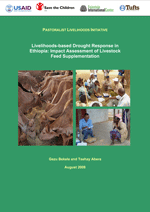This impact assessment aimed to measure the impact of an emergency livestock feed supplementation program implemented by Save the Children US during drought in pastoralist communities in Liben district (Guji Zone) and Arero district (Borena Zone), Oromia region. The drought had affected the area from April 2007 through to April 2008, and under the intervention in Borena 6,750 cattle were fed.
The assessment was initially designed to produce a quantitative analysis of the feeding program using cattle mortality as the main indicator of livelihoods impact. Under a livelihoods approach, this relates to the objectives of protecting key assets and assisting post-drought recovery. As the assessment began, other benefits were also apparent such as improved body condition of cows, calf survival and births, and milk production. Therefore, these indicators of impact were also measured.







